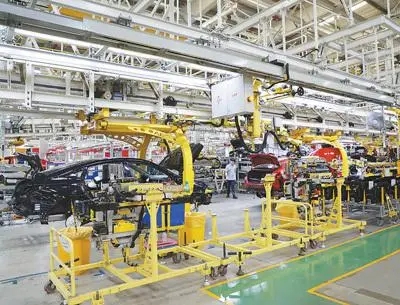Author:MarwenDate:2023-9-14

Recently, in the final assembly workshop of SAIC CP Co., Ltd. in the Hemeile Industrial Zone, Chonburi Province, Thailand, a batch of MG brand cars were assembled and were waiting to roll off the assembly line after undergoing multiple quality inspection procedures (see the picture above, photographed by our reporter Sun Guangyong ). In recent years, Chinese automobile brands such as SAIC CP MG, Great Wall, BYD, and Nezha have successively invested in and set up factories in Thailand to realize overseas production of electric vehicles.
In April this year, SAIC CP New Energy Industrial Park laid the foundation stone. The industrial park covers an area of 120,000 square meters, focusing on the localized production of key parts for new energy vehicles and creating a new energy vehicle ecosystem. It is understood that the first phase of the project will be completed within the year, and the overall project will be completed in the first half of 2024.
In May, SAIC CP Co., Ltd. launched the first batch of pure electric business models "New MG Maxus 9" in the Thai market. It is currently the only high-end pure electric multi-purpose business model in the Thai market. "Electric cars are very quiet, have comfortable seats, and have relatively low operating costs." Taxi driver Supaji told reporters that in addition to MG, electric taxis such as BYD are also common, which are a bright spot among the tens of thousands of taxis in Bangkok. Due to the beautiful scenery, many passengers will deliberately choose electric vehicles to travel.
Data from the Automobile Association of Thailand shows that in 2021 and 2022, Chinese car brands will account for 90% of Thailand’s pure electric vehicle market. In 2022, Thailand's pure electric vehicle sales will reach 13,454 units, a year-on-year increase of 588.5%. It is expected that Thailand's pure electric vehicle sales will exceed the 50,000 mark this year.
"Chinese automakers are 'running' to enter Thailand's new energy vehicle market." said Kevalin, deputy general manager of Thailand's Kasikorn Research Center. Pang Sa, vice president of SAIC CP MG (Thailand) Auto Sales Co., Ltd., said that Chinese car companies have launched a batch of cost-effective electric vehicle products that meet market demand in response to local consumer preferences. This is the most popular Chinese car brand in Thailand. important reason.
Thailand's series of policies and measures to promote the development of the new energy vehicle industry have also created favorable conditions for Chinese companies to take root in the Thai market. The Thai government launched the "30/30" policy in 2021, proposing that 30% of its domestically produced cars will be zero-emission vehicles by 2030, and the number of zero-emission vehicles will reach 1.35 million by 2035. Subsequently, the government implemented an electric vehicle subsidy program and tax incentives. Currently, subsidies ranging from 70,000 to 150,000 baht (1 US dollar equals 36 baht) are provided depending on the specific model of electric vehicles. In terms of taxation, from June 2022 to the end of 2025, the consumption tax on electric passenger cars will be reduced from 8% to 2%, and the 10% consumption tax on electric pickup trucks will be directly exempted; in terms of road tax, from October 1, 2022 to 2025 Electric vehicles registered on September 30, 2018 will be exempted from road tax by 80%.
Nali Tesathirasa, Secretary-General of the Investment Promotion Board of Thailand, said that the competitive advantage of Chinese new energy vehicle companies in Thailand stems from their excellent technology and innovation capabilities, and the cooperation between Thailand and China in the new energy vehicle industry has broad prospects.
(Bangkok, September 13th)
Source: People’s Daily Author: Sun Guangyong Yang Yi
↓Next [ Chinas new energy vehicle "Phalanx" shines at the Munich Motor Show in Germany ]









